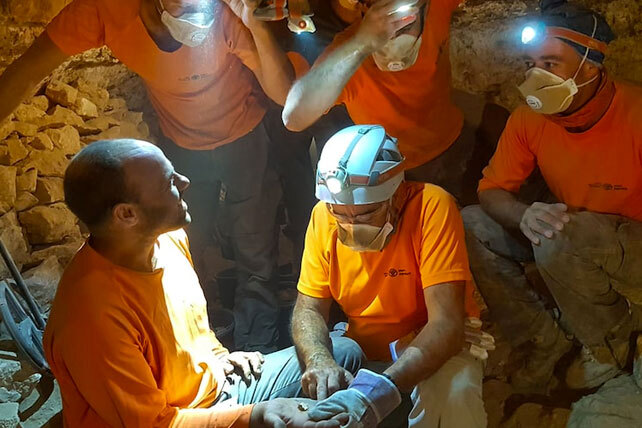It sounds something like a thrilling plot for a new Indiana Jones movie, but it is a non-fiction story of archeological heroism coming out of Israel. A team of archeologists and young people participating in pre-military programs executed a highly technical cave expedition to rescue priceless artifacts—newly-discovered fragments of the Dead Sea Scrolls.
In a report by CBN News, director of the Israeli Antiquities Authority (IAA), Israel Hasson, said, “The desert team showed exceptional courage, dedication, and devotion to purpose, rappelling down to caves located between heaven and earth, digging and sifting through them, enduring thick and suffocating dust, and returning with gifts of immeasurable worth for mankind.” The artifacts in this recent discovery came from a cave dubbed the Cave of Horror in the Judean Desert.
The originally discovered scrolls hold the earliest written pieces of Biblical Scripture ever found and are one of the most celebrated finds in Biblical archeology. Many caves in Israel’s Dead Sea region are thought to hold more scroll fragments. These caves have been targeted by thieves for a century or likely longer, putting pressure on the archeological team to recover pieces that could remain.
The First of the Dead Sea Scrolls and Their Ancient Keepers
An article by Church Leaders, gives a brief background on the originally discovered Dead Sea Scrolls. “The first Dead Sea Scrolls were discovered in 1946 and 1947. More were discovered in 1956, and now we have this new finding [of additional caves, identified in 2017, that could hold more scrolls]. The Scrolls are a collection of 981 manuscripts that are believed to be from 408 BC to 318 AD. The caves containing the scrolls derive their name from the nearby Dead Sea and are located in the West Bank of the Jordan River.”
The Dead Sea Scrolls were written and preserved by an ancient sect of Jewish men called the Essenes. They lived an ascetic lifestyle and remained separated from the rest of society—living in the caves near the Dead Sea and establishing a community known as Qumran. Much else about this group of Essenes is shrouded in historic mystery but an article in Christianity Today fills in more details.
“Like the Pharisees, they [the Essenes] stressed strict legal observance, but they considered the temple priesthood corrupt and rejected much of the temple ritual and sacrificial system. However, the Essenes were never mentioned in the Bible, unlike the Pharisees and Sadducees.
Mentioned by several ancient writers (such as Philo of Alexandria, Josephus, and Pliny the Elder), the precise nature of the Essenes is still not certain, though it is generally agreed that the Qumran community that produced the Dead Sea Scrolls was an Essene group. Pliny numbered the group at around 4,000 men.
The name Essenes was not a name chosen by the group itself, but rather assigned by scholars and writers. The Qumran community referred to themselves as ‘Sons of Zadok,’ ‘Men of the Community,’ ‘Members of the Covenant,’ ‘Sons of Light,’ etc. The root meaning of Essenes is debated to mean either ‘The Modest Ones,’ ‘The Silent Ones,’ or perhaps ‘pious.’”
Additional Artifacts Found With New Scroll Fragments
Excavations of the roughly 300 caves near the Dead Sea ramped up in 2017 and this fresh discovery of scrolls is the first in 60 years. The artifact recovery came with a few other archeological and historical treasures. Fox News offers the interesting details:
“The operation uncovered additional finds from various periods: rare coins from approximately 2,000 years ago, a 6,000 year old skeleton of a child, likely female, wrapped in cloth and mummified, and what may be the oldest surviving basket in the world, made of woven reeds.
The basket, complete with lid, is more than 10,500 years old, based on radiocarbon dating by Professor Elisabetta Boaretto of the Weizmann Institute of Science in Rehovot, the IAA said. That is the Neolithic period, predating the arrival of pottery in the region.”
The new scroll fragments themselves reportedly contain pieces of the books of Zechariah and Nahum. The contents are written primarily in Greek but also contain Ancient Hebrew letters for spelling the name of God.
This latest discovery highlights the importance of the current excavation efforts of the many Dead Sea region caves. Hasson urges the continuation of the work. In the CBN News report, “Hasson said the scroll fragments are a ‘wakeup call to the state’ that it must allocate resources to complete ‘this historically important operation.’ He said they need to ensure that all the data is discovered and recovered before the robbers find it.”

